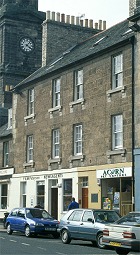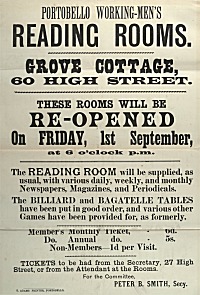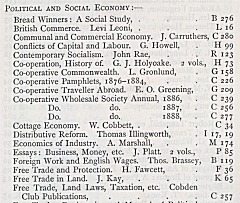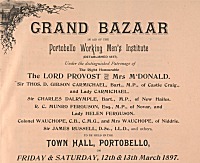Contents ![]() | The earliest public libraries
| The earliest public libraries ![]() | Learning organisations
| Learning organisations ![]()

The Working Men's Institutes
Page 1 of 2 | Next
The first burst of enthusiasm for schools and arts and mechanics institutes began to fall away after a few years. In many places the original ideals of the founders were lost and the institutions drifted towards being comfortable, middle class lecture and social societies.
In the 1860s Samuel Smiles, who had attended Haddington School of Arts in his youth, saw most as failures. He especially hated those that had become conservative in aspiration - unadventurous. Smiles preferred to support mutual improvement societies - working men teaching themselves, as did the first mathematical students of Edinburgh School of Arts. Smiles coined the phrase (and wrote a series of popular manuals around) 'Self-help'.

The first working men's institute opened in 1858 in Salford, England. Henry Solly, who helped set up the 'Working Men's Club and Institute Union', noted that this club, alongside other early examples, provided the working man with, "social intercourse, innocent amusement, mental improvement and mutual helpfulness". Solly was determined to promote temperance, sociability, education and fraternity on a national level. Although the temperance ideal was abandoned in 1863, the other aims were met by introducing libraries, sports and entertainment.

Edinburgh Working Men's Club and Institute opened in 1864. One of the aims of the Institute was to offer 'facilities to the working men of the city, and others for social intercourse, for reading the periodical literature of the day, for obtaining such information as is to be derived from books and from lectures of interest and importance'. There was a reading room and a library, which had 4300 books by 1888. Members could suggest which books should be provided for the readers.

Portobello Working Men's Institute was established in 1877 by Dr Andrew Balfour, Mr J. Fraser, Mr H. Rhind and Mr Walter Ireland. They wanted to provide young men with an alternative to the public house. So to become a member a man had to promise to abide by three rules - no swearing, no drinking and no gambling. The Institute was non-denominational, and non-political. At the institute the members relaxed by playing billiards and board games such as dominoes but it always provided newspapers, magazines and books which could be read on the premises, or borrowed to read at home.
Page 1 of 2 | Next
In this section:
Schools of arts and the mechanics institutes | Working Men's Institutes | Trust public houses
Contents ![]() | The earliest public libraries
| The earliest public libraries ![]() | Learning organisations
| Learning organisations ![]()